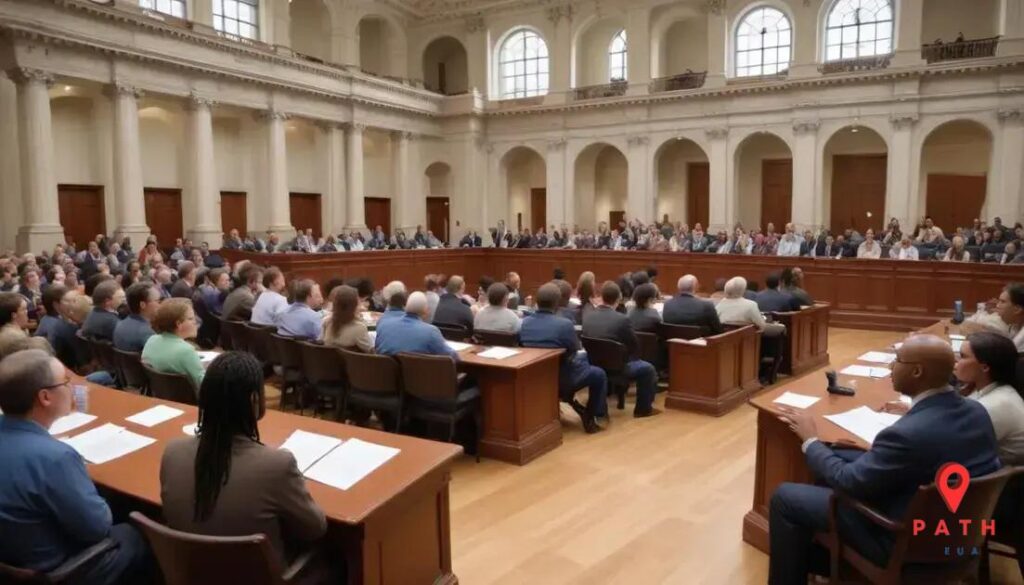Public hearings on education regulations: why they matter

Anúncios
Public hearings on education regulations allow community members to voice their opinions and influence policies that directly impact local schools and student outcomes.
Public hearings on education regulations serve as platforms where community voices can be heard. Have you ever wondered how these discussions shape the future of our schools? Let’s dive in!
Understanding education regulations
Understanding education regulations is crucial for anyone involved in the school system. These regulations help shape the policies that govern our schools, ensuring that every student receives a quality education. They address everything from curriculum standards to school safety measures.
Regulations vary by state and can impact how schools operate. Familiarizing yourself with these rules can be a game changer for parents, educators, and policymakers alike.
Key Areas of Education Regulations
Some main components of education regulations include:
- Curriculum Standards: These standards outline what students should learn at each grade level.
- Funding Guidelines: Regulations determine how schools can allocate their budget and resources.
- Safety Protocols: They establish rules for emergency preparedness and student safety in schools.
For more information on education regulations, you can visit the U.S. Department of Education’s official site.
Anúncios
| Topic | Key Insight | Consequence |
|---|---|---|
| Education Regulations | Shape curriculum and operations | Ensure educational quality |
| Public Hearings | Allow community feedback | Influence local education policy |
| Transparency | Open and accessible process | Builds public trust |
| Funding Concerns | Allocation transparency needed | Impacts classroom resources |
| Curriculum Updates | Modernization discussions ongoing | Reflects evolving student needs |
| Teacher Support | Advocated during hearings | Need for training and tools |
| Student Mental Health | Major concern in discussions | Push for wellness programs |
| Community Participation | Citizens influence education policy | Leads to meaningful change |
The role of public hearings in policy making
Public hearings play a vital role in the policy making process. They allow community members to voice their opinions and concerns about proposed regulations, especially in education. These meetings give everyone an opportunity to participate in discussions that affect their lives.
During public hearings, stakeholders can present their views, which helps lawmakers understand the impact of potential regulations on the community.
Why Public Hearings Matter
Public hearings serve several important purposes:
- Transparency: They ensure that the policy making process is open and accessible to all.
- Informed Decisions: Hearing from the community provides valuable insights for lawmakers to make better decisions.
- Accountability: Public participation holds policymakers responsible for their choices and actions.
To learn more about the importance of public hearings, check out the National Conference of State Legislatures.
Key issues discussed in recent hearings

In recent public hearings regarding education regulations, several key issues have emerged. These discussions highlight the concerns of community members and the need for effective policies.
Funding for Schools is a major topic. Many parents and educators worry about how budgets are allocated. Ensuring funds reach classrooms is vital for student success.
Critical Topics Addressed
Additionally, the following issues have gained attention:
- Curriculum Changes: There are discussions around updating what students learn to meet current needs.
- Teacher Support: The importance of providing teachers with the resources and training they need is frequently mentioned.
- Student Mental Health: Stakeholders are emphasizing the need for programs supporting student wellness.
For detailed insights on these discussions, you can visit the National Education Association’s website.
How to participate in public hearings
Participating in public hearings is an excellent way to express your views on education regulations. It gives you the chance to directly influence policy making in your community.
Before attending, it is helpful to familiarize yourself with the topics being discussed. This allows you to speak on points that matter to you.
Steps to Participate
Here are some steps to help you engage effectively:
- Research Topics: Understand the key issues on the agenda and gather any relevant information.
- Prepare Your Comments: Write down your thoughts and questions to present clearly during the hearing.
- Arrive Early: Sign up to speak if there is a list and ensure you have enough time to settle in.
For resources and guidelines on how to participate, visit the International Association for Public Participation’s website.
Impact of regulations on local schools
The impact of regulations on local schools is significant and wide-ranging. These rules shape how schools operate and can directly affect student outcomes.
Education regulations establish standards for curriculum, funding, and teacher qualifications. These elements are crucial for ensuring a quality education.
Key Effects of Regulations
Regulations can influence local schools in several ways:
- Resource Allocation: Regulations determine how funds are distributed, impacting the resources available to schools and teachers.
- Curriculum Development: They guide what subjects are taught and how they are approached, ensuring students receive a well-rounded education.
- Accountability Measures: Regulations create benchmarks for assessing school performance, holding educators accountable for student achievement.
For a deeper understanding of how these regulations affect schools, refer to the U.S. Department of Education.
The Importance of Engaging in Education Regulations
Understanding and engaging with education regulations is crucial for every community member. Public hearings, discussions, and active participation allow you to express your views and influence decisions that impact local schools.
Being informed about the key issues discussed and the regulations in place can empower parents, educators, and students alike. It is essential to recognize how these regulations shape our schools and the future of education.
Ultimately, participating in these processes can lead to positive changes, ensuring that every child receives a quality education.



